
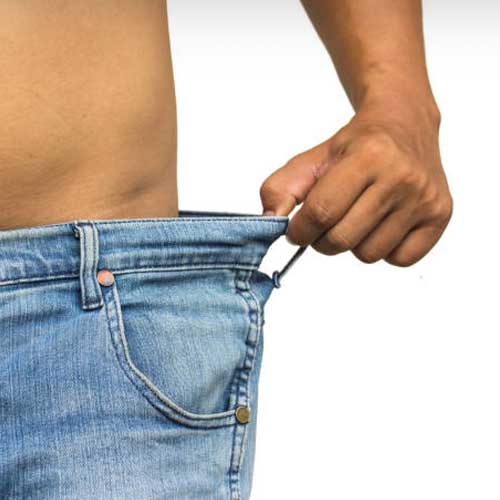
Bariatric surgery is the collective term for types of weight-loss surgery. At Digestive Health Institute, we perform all types of primary and redo bariatric procedures such as Laparoscopic Banded Gastric Bypass, Laparoscopic Sleeve Gastrectomy, Laparoscopic Duodenojejunal Bypass, Laparoscopic Single Anastomosis Duodeno-Ileal Bypass (SADI) and Mini Gastric Bypass.
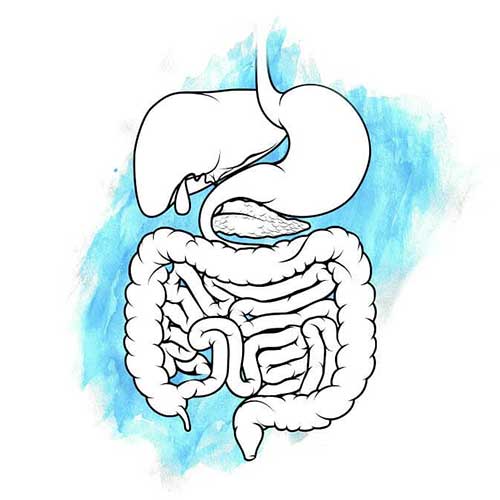
One of the most popular bariatric surgeries across the globe, the laparoscopic sleeve gastrectomy is an irreversible procedure that curtails the size of the stomach by surgically removing approximately two-thirds of it, making it roughly the size and shape of a banana. The procedure also eliminates most of the cells that produce ghrelin, the hunger-inducing hormone; thus, reducing your eating capacity post surgery and helping you lose weight quickly.
This procedure is the preferred choice for younger patients suffering from morbid obesity. It is helpful for patients suffering from various side-effects of obesity, such as diabetes, high blood pressure, sleep apnea, and PCOS. While the laparoscopic sleeve gastrectomy is a great first- stage procedure for patients falling under the super super obese (BMI more than 60-70) category, it is not recommended for patients suffering from severe gastroesophageal reflux disease or large hiatus hernia
Nearly 60 to 80 per cent of your excess body weight will reduce over a period of one-and-a-half years. You will observe rapid weight loss within the first three to four months post surgery, after which the rate of weight loss will slow down. You may also regain the lost weight due to overconsumption of high-calorie foods and liquids, and lack of regular physical exercise. However, you can avoid this, if you follow our exercise, nutrition and lifestyle tips, and maintain a proper follow-up routine.
The nerves of the stomach and the outlet valve (pylorus) are not altered, preserving the function of the stomach. The rest of the gastrointestinal tract anatomy is also not altered, so the food ingested follows the normal course. This results in a lesser chance of vitamin and mineral deficiencies and decreases the possibility of dumping syndrome.
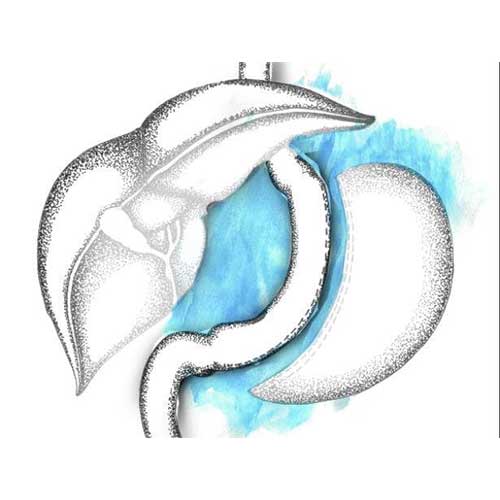
This procedure is the preferred choice for younger patients suffering from morbid obesity. It is helpful for patients suffering from various side-effects of obesity, such as diabetes, high blood pressure, sleep apnea, and PCOS. While the laparoscopic sleeve gastrectomy is a great first- stage procedure for patients falling under the super super obese (BMI more than 60-70) category, it is not recommended for patients suffering from severe gastroesophageal reflux disease or large hiatus hernia.
Nearly 60 to 80 per cent of your excess body weight will reduce over a period of one-and-a-half years. You will observe rapid weight loss within the first three to four months post surgery, after which the rate of weight loss will slow down. You may also regain the lost weight due to overconsumption of high-calorie foods and liquids, and lack of regular physical exercise. However, you can avoid this, if you follow our exercise, nutrition and lifestyle tips, and maintain a proper follow-up routine.
The nerves of the stomach and the outlet valve (pylorus) are not altered, preserving the function of the stomach. The rest of the gastrointestinal tract anatomy is also not altered, so the food ingested follows the normal course. This results in a lesser chance of vitamin and mineral deficiencies and decreases the possibility of dumping syndrome.
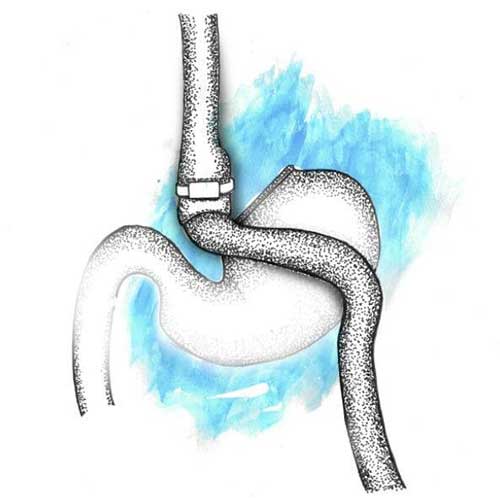
Laparoscopic banded gastric bypass is a reversible weight-loss procedure which involves stapling off a section of the stomach, thereby creating a pouch and reducing the stomach size. This allows food to bypass the beginning of the small intestine, which is the duodenum and part of the jejunum. In addition, a silicon ring is placed over the pouch to prevent dilatation of the pouch. Post surgery, your appetite reduces, as you feel satiated with smaller portions of food.
Laparoscopic banded gastric bypass is the procedure of choice for those who have severe acid reflux and/or high cholesterol. Patients who have suffered from diabetes for over 10 years also benefit from this surgery. This is also an excellent procedure to reduce BMI in order to achieve and maintain better weight loss. It may also be recommended to individuals who have persistent acid reflux and/or weight regain after a sleeve gastrectomy.
You will not be able to eat as much as you did prior to the surgery. You must also be careful about the ‘dumping syndrome’ that occurs in some patients post the surgery. This is when food passes too quickly into the intestine, causing nausea, cramping, bloating, dizziness, etc. Generally, it is triggered by eating high-calorie foods such as sweets and certain carbohydrate sources. This procedure also requires compliance with lifelong supplementation. In extremely rare cases, constant overeating can cause the silicon ring to enter the stomach, necessitating an endoscopy for its removal.
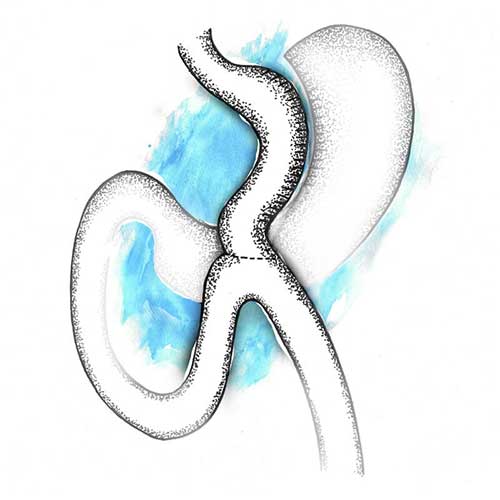
Laparoscopic mini gastric bypass is a variant of the gastric bypass surgery. It sees a loop of the small intestine being joined to the stomach pouch at a distance of 150 to 200 cm.
It is the procedure of choice for patients who do not suffer from gastroesophageal reflux disease and are aged above 50. It may also be recommended for patients on multiple anti-depressants or anti-psychotic medication.
Like other procedures, nearly 60 to 80 per cent of your excess body weight will reduce over a period of one-and-a-half years with rapid weight loss during the first three to four months after surgery. Though the chances of regaining the lost weight are negligible, it is possible if you do not follow a healthy lifestyle according to our recommendation.
Post-surgery, vitamin and mineral supplements need to be taken regularly and for life. Overconsumption of high-calorie liquids or foods may cause diarrhea. There is also a possibility of marginal ulcers and bile reflux, causing abdominal discomfort.
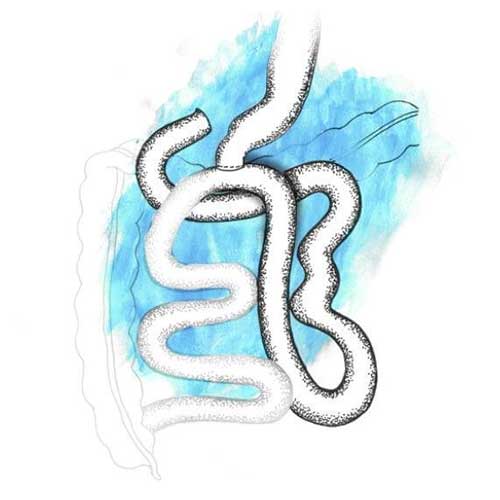
This procedure involves creating a sleeve by surgically removing two-thirds of the stomach portion and then also bypassing the first 100 - 150 cms of the small intestine. It is then joined as a loop to the first part of the small gut, which is the duodenum.
Laparoscopic duodenojejunal bypass is the procedure of choice for patients with lower BMIs but suffering from diabetes. It is also recommended for patients who have undergone a sleeve gastrectomy and have either regained weight or have been diagnosed with severe diabetes once again.
Nearly 60 to 80 per cent of your excess body weight will reduce over a period of one-and-a-half years. Rapid weight loss will occur within the first three to four months after surgery. Thereafter, the weight loss rate will slow down. However, if you do not follow a fitness regime combined with healthy diet and regular follow-up, you are most likely at the risk of regaining your lost weight soon.
Post-surgery, vitamin and mineral supplements need to taken regularly, for the rest of your life. Eating high-calorie foods could cause diarrhea in some patients.

SADI involves bypassing almost the entire length of the small intestine, leaving only 200–250 cms for nutrient absorption.
This is a second-stage procedure for heavily obese patients who require additional weight loss of about 30 to 40 kgs, and who have already undergone a primary procedure such as sleeve gastrectomy.
Weight loss occurs in the first six months post surgery, after which it stabilizes, approximately one-and-a-half years after the procedure.
Protein supplementation as well as vitamin and mineral supplementation are non–negotiable post this surgery. Fat-soluble vitamins such as A, D, E and K need to be replaced. Patients who undergo this procedure must be willing to commit to high levels of supplementation for their lifetime. Some patients may complain of diarrhea and flatulence post surgery.

 Before
Before
 After
After
BHAVANA SARAWAL
MUMBAI, INDIA
Surgery Type - Laparoscopic Sleeve Gastrectomy
Surgery Date - Nov 06, 2013
The issue with being overweight, other than your clothes not fitting, is how you constantly feel unhealthy. Everything around you is just slow and that eventually has a direct effect on how you think and behave. It affects your entire life.all kinds of scarless surgical treatments in the digestive space.
I can’t thank DHI and the entire team there enough for helping me reduce over 30* kgs in just a few months. Truly. Thank you so so so much!
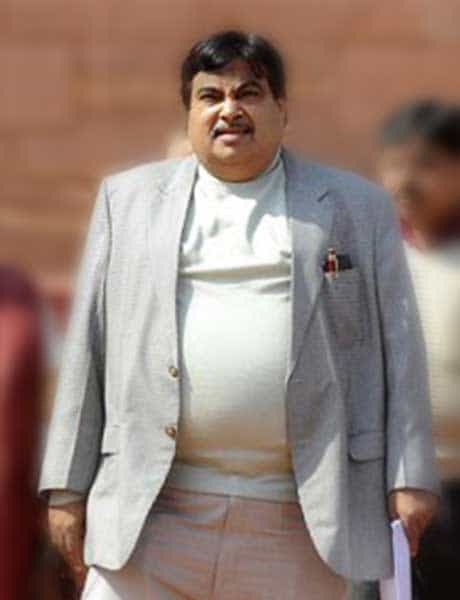 Before
Before
 After
After
Nitin Gadkari
MUMBAI, INDIA
Surgery Type - Laparoscopic Gastric Bypass (LGB)
Surgery Date - September 12, 2011
Was a long standing, uncontrolled diabetic on high dose of insulin+ 3 oral anti diabetic medications, despite which his sugars were uncontrolled. In addition he was also hypertensive (high BP) & on regular medications.
Post-surgery – He is off insulin and medications for diabetes and blood pressure.
 Before
Before
 After
After
Salma Khan
MUMBAI, INDIA
Surgery Type - Laparoscopic Gastric Bypass(LGB)
Surgery Date - January 23, 2013
Had great difficulty in walking around due to severe pains. In addition she was hypertensive and on regular medications for the same.
One year post operatively she is off all medications.
She loves her new self and the compliments she is being showered with. She is more independent than ever is making the most of new lease on life!!! Previous
 Before
Before
 After
After
Sunaina Roshan
MUMBAI, INDIA
Surgery Type - Mini Gastric Bypass
Surgery Date - March 28, 2014
“I walk for one hour. I eat everything but in small portions because my stomach has shrunk. I can’t eat beyond a certain point. And this makes me feel lighter and confident,” she said.
"Now that’s what I call a transformation !! So so proud of you didi” - Hrithik Roshan
 Before
Before
 After
After
Daulatram Jogawat
MUMBAI, INDIA
Surgery Type - Laparoscopic Banded roux – en – y Gastric Bypass
Surgery Date - March 02, 2017
“Earlier, I was unable to walk & had difficulty in breathing. After losing 55kgs, I am feeling fit, I can breathe easily & walk. I am following the instructions for diet & 1-hour walk, given by the doctors. My overall health has improved.
The entire Jogawat family and I would like to thank Dr. Lakdawala and his team for helping me live a healthier life"
 Before
Before
 After
After
Mr. Venkaiah Naidu
Delhi, India
Surgery Type - Laparoscopic Gastric Bypass (LGB)
Surgery Date - July 09, 2012
Sugars levels are well controlled with only oral medications. No insulin needed. Antihypertensive medication reduced to half. Acidity has been resolved and joint pain negligible.
Confesses to feeling younger, lighterand sprightlier is now able to keep up with hectic schedule. Is more energetic, walks daily and indulges in a game of badminton regularly.
If you find yourself struggling with one of the below-mentioned problems or both, you are eligible to undergo
Obesity leads to various co-morbidities which hamper your quality of life and reduce your life expectancy. Several studies have concluded that morbidly obese individuals who undergo bariatric surgery are at a lower risk of death in comparison to people who choose conventional techniques for weight loss. However, the situation may vary from one person to another depending on the level of health damage already caused.
Bariatric surgery improves the overall quality of life. In addition to improved health and longevity, weight loss surgery has a positive impact on various physical functions such as mobility, flexibility, and sexual function. Alternatively, it also promotes emotional well-being through enhanced self-esteem and social interactions. As a result, it helps reduce stress and depression.
In most cases, you will be allowed to return home the same day or the next day. However, in cases of advanced procedures, you may be asked to stay in the hospital for 3-4 days for observation. After the surgery, you can get back to your routine in 3 days and can resume work in 5 days. If your job involves lifting heavy weights, then you may need to stretch the duration to at least a week before getting started.
You can get insurance coverage for bariatric surgery if you make a wise policy choice. Insurance companies provide various health insurance policies, some including bariatric surgery coverage and some excluding the category. However, most companies offer covered benefit for obesity surgery only if your BMI is 40 and above or if your BMI is 35 and above and you are suffering from severe co-morbidities. Some insurance companies also limit the coverage benefit to specific types of weight loss surgery.
Bariatric surgery is not just a means of shedding the extra weight off your body. It provides various other benefits that will improve your overall health and lifestyle. Some of these benefits include:
While weight loss surgery works wonders for many, there are a few post-operative risks and complications that may affect you. Some of these include: